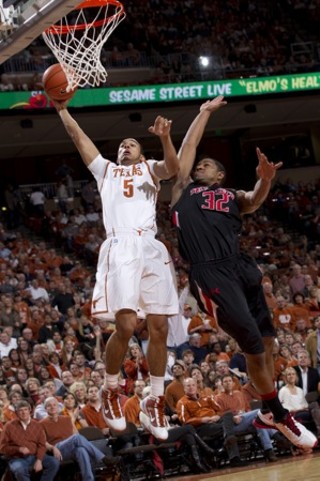Five-Second Violated
UT's season ends on a blunder
By Russ Espinoza, 3:10PM, Thu. Mar. 24, 2011

The final, fatal 14.5 seconds of Texas’ controversial 69-70 loss to Arizona on Sunday in the second round of the NCAA Tournament prompted the Wildcats’ hometown paper – the Tucson Citizen – to issue a painfully evocative headline: “Arizona in the NCAAs: It’s a charmed life.”
The infamous saga of Texas’ final breaths of 2010-11 reads like a Shakespearean tragedy, where extreme misfortune rapidly accumulates to a breaking point that leaves everyone dead and the kingdom in ruins.
Arizona’s dumbfounding succession of good fortune kicked off with a blunder Longhorn fans can’t pin on systemic referee incompetence; Jordan Hamilton’s haunting timeout following his rebound of an errant Derrick Williams shot forced teammate Cory Joseph’s abortive, abbreviated in-bounds attempt moments later. Finding nobody open, the freshman guard motioned for a timeout to referee Richard Cartmell, but was instead whistled for a five-second violation. The Wildcats capitalized on their gifted possession and took the lead on a seeing-eye three-point play by star forward Derrick Williams with 9.6 seconds remaining.
“The timeout was definitely called after four seconds,” Texas head coach Rick Barnes said at the podium after the game. Referees use a chopping motion to hold count, and the infallible instruments of technology confirm that Cartmell issued the violation prematurely – having made only four “chops.” By rule, officiating crews are not allowed to review such plays.
With Barnes and his men dejected and dumbstruck in their Tulsa, Okla., locker room, Cartmell told a reporter, “I had to make a decision whether it was five seconds or a timeout and I made a decision it was five seconds because I had counted five seconds before he called timeout.”
“It’s a very hard game to officiate,” Barnes said. “But the (five-second) counts, I don’t think anyone should ever make a mistake on that, ever. I mean, ever.”
Cartmell’s illegitimate five-second call assisted Arizona as the precursor to Derrick Williams’ circus flip-in that tied the game at 69-69. Anthony Gimino of the Tuscon Citizen described the play: “Arizona Wildcats sophomore Derrick Williams didn’t even know the shot went in. He just drives to the hoop as Texas’ Jordan Hamilton crashes into his legs, flips up a shot with his right hand, braces for the fall and hopes for the best. With the game hanging in the balance. ‘Surprised it went in,’ Williams said in a postgame interview. ‘Glad it went in.’ Then Williams made one more shot go in – the free throw for a 70-69 lead.”
Gimino added: “Hey, is this fun or what?” Texas nonetheless had a final possession of 9.6 seconds to push the ball all the way up the court – a la UCLA’s Tyus Edney in the 1995 tournament against Missouri – and take the power back. While suspicious calls went Arizona’s way only seconds earlier, calls against Arizona were questionably absent during J’Covan Brown’s aggressive drive to the basket and senior forward Gary Johnson’s hard-fought rebound and attempted put-back amid a swarm of Wildcat defenders.
“Every player’s going to think he got fouled in that situation. But it’s hard for the refs to call it when the game’s on the line,” said Brown — having scored 21 of his 23 points in a sterling second-half performance.
“I felt a lot of contact,” said Johnson – whose career at Texas is over – after the game. “I turned and looked to the ref. I thought I heard a whistle. I saw cameras coming on the court.”
Lights out.
Happy trails to guard Dogus Balbay, forward Gary Johnson, guard Jai Lucas, and center Matt Hill.
While the Tucson press was basking in Arizona’s first Sweet 16 berth since 2005, a Kirk Bohls column in the Austin American-Statesman titled “Another disappointing finish for UT men” was simultaneously unafraid to condemn the officiating while also highlighting Texas’ exponentially larger, and recurring problem of faltering when the stakes are highest. Obviously, head coach Rick Barnes has been the common denominator on Texas’ growing rap sheet. A sizable, and vocal contingent of Longhorn fans doubt that Barnes can deliver the school’s first championship – despite his consistent delivery of NBA caliber talent from the recruiting trail, and making UT a reliable presence in the Top 25. These are the unique advantages of Barnes’ leadership that the vast majority of schools don’t enjoy, and that UT itself seldom experienced prior to the Barnes era.
But as Bohls points out: “A team can’t pick when it peaks, but Texas never got better after starting out 23-2, and finished with a mediocre record down the stretch. And that’s on Barnes, who is being pigeonholed as a coach whose teams taper off and don’t play well on the big stage in March.”
As bittersweet as Austin’s relationship with Barnes has become, UT’s recent history of late-season flame-outs threatens to spin the narrative in a decisively negative direction. The 2010-11 Longhorns were briefly the toast of college basketball following a late-January sweep of Big 12 adversaries Kansas, Texas A&M, and Missouri; they’d been ranked No. 10, No. 7, No. 5, and No. 3 at varying stages of the regular season and accordingly had a slab of impressive wins to their credit. Once again, there was practical talk of a No. 1 seed and a conjuring up of Barnes’ 2003 Final Four squad.
Why then did UT suffer down the stretch from a milder case of what plagued them the year before? Where the former finished 5-5 and the latter finished 7-10.
“Breakdowns” are the simple answer – within every individual (save guard J’Covan Brown) and in every dimension of the game. The Longhorns were a shell of their former selves after their 67-70 loss at Nebraska on February 19. The contrast in points allowed between the 10 games prior and the 10 games after suggest that fatigue and/or loss of discipline set in. Jordan Hamilton – the team's leading scorer at 18.6 points per game – slumped all-around during UT’s 8-day fiasco against Nebraska, Colorado, and Kansas State; and freshman sensation Tristan Thompson played far-and-away his worst game of the season at precisely the wrong time: having scored only 3 points on 1 of 4 shooting in Sunday’s elimination game against Arizona.
“I feel sorry I let the seniors down,” Thompson said afterward. “I got double-teamed a lot. (Arizona head coach) Sean Miller game-planned a good game on me. He neutralized me or at least made it difficult.”
To paraphrase a cliche adage in sports, an ugly win is still a win. Were it not for Texas being victimized by shoddy, gutless officiating on Sunday afternoon, we’d all be pleasantly surprised with Rick Barnes and company for rescuing their season. UT played a gruesome first half, characterized by 38.5 percent shooting, 10 turnovers, and an 11-point halftime deficit; yet, they – behind a resurgent J’Covan Brown – clawed back with grit and heart to win the final 19 minutes and 45.5 seconds against the fifth-seeded Wildcats.
The rest is history. And so too are the Longhorns.
A note to readers: Bold and uncensored, The Austin Chronicle has been Austin’s independent news source for over 40 years, expressing the community’s political and environmental concerns and supporting its active cultural scene. Now more than ever, we need your support to continue supplying Austin with independent, free press. If real news is important to you, please consider making a donation of $5, $10 or whatever you can afford, to help keep our journalism on stands.
April 27, 2015
April 25, 2015
cory joseph, j'covan brown, rick barnes, tristan thompson








